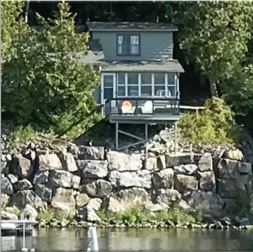Selectboard reverses development review board and may reverse itself
It appears now that the town may not have reached a settlement on a case that would allow construction on Barbara Russ and Dean Williams’ camp on Thompson’s Point.
So, if you felt you’d missed your chance to weigh in on whether Russ and Williams should get approval for tearing down a camp that was built in 1940 and replacing it with a two-story structure that’s more than twice as big, show up for the Charlotte Selectboard meeting on Sept. 11.

It looked like the approval process was finished on Aug. 28, when the board voted 3-1 to approve a settlement deal negotiated between the town attorney and Russ and Williams. Their original application had been denied by the development review board and Russ and Williams appealed the case to the Environmental Division of Superior Court.
As it usually does in such cases, the environmental court encouraged the parties to see if they could negotiate an agreement.
Once a case is appealed, it is no longer a development review board decision and moves on to the selectboard to decide.
After reaching its decision on Aug. 28, the selectboard realized it had not given either members of the development review board or of the conservation commission the opportunity to comment, as had been promised at the selectboard meeting on May 1, town administrator Dean Bloch said.
So, the selectboard will revisit the issue at its meeting at 6:30 p.m. this Monday.
Before the selectboard went into closed session to consider the details of the proposed settlement on Aug. 28, it opened the floor to comments about the issue.
Claudia Mucklow of the conservation commission criticized the proposal to replace a just over 700 square-foot camp with a structure that’s almost 1,770.
Built before there were construction restrictions, the camp is too close to the lake. The application proposes to move the camp back 8 feet, but Mucklow said, this would move the camp structure into another slope that’s steeper than 25 degrees.
“The land-use regulation is very clear. You can not construct into a steep slope of 25 percent or more. There is no ifs or buts,” Mucklow said. “That steep slope represents a rare natural community called a limestone bluff, cedar pine forest.”
This rare type of forest should be protected, but the application proposes cutting down 16 trees, 10 of which have diameters greater than 2 feet and are probably more than 100-years-old, old-growth trees, she said.
Furthermore, Mucklow said, “The lease does not allow for any replacement of the camp unless it is through a catastrophic event, like a fire or storm.”
Carol Conard, who lives next door to Williams and Russ’ camp, said the application process was “incredibly opaque” and detailed the trouble she had getting information about it.
Just prior to the board going into a closed session to discuss the proposed settlement, Conard said she wanted to know what the specific finding was that would cause the board to go into executive session.
Neither the board nor the attorney revealed the specific reason for the executive session. Attorney David Rugh recited how the premature “general public knowledge of the discussion in an executive session could disclose confidential attorney-client privileged information and the town’s negotiating strategy.”
After the selectboard returned from executive session, Frank Tenney made a motion to approve the proposed resolution of the Russ and Williams’ appeal of the development review board denial and this was approved with three votes in favor of the agreement. Louise McCarren cast the lone selectboard vote against the agreement. Kelly Devine was absent.
Rugh said that the approval of the motion did not deny anyone of their rights, that interested parties still have the right to participate before the environmental court. (And as it turned out, at the selectboard meeting this Monday, Sept. 11.)
JD Herlihy said the board should have released to the public what the stipulations are in the negotiated agreement, but Rugh disagreed, saying he was not aware of any law requiring the release of contents of an executive session, “particularly when it’s all attorney-client privileged conversation.”
